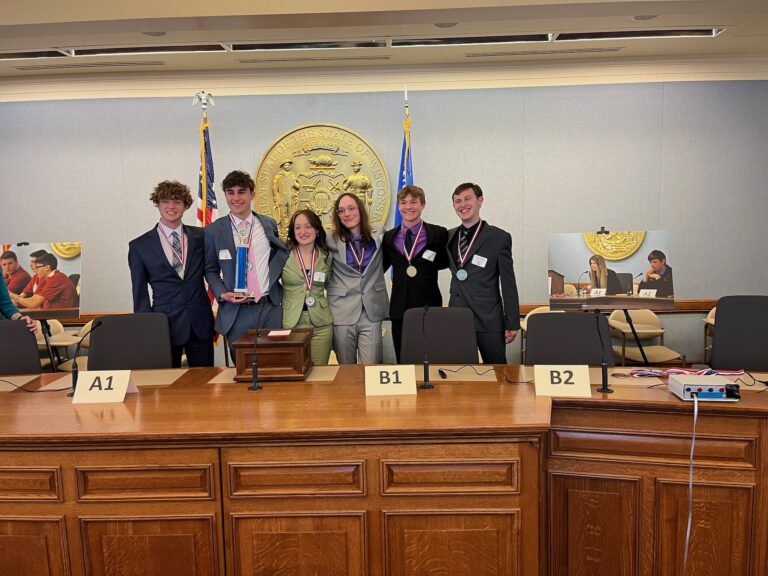The Capitol Report, produced by WisPolitics.com — a nonpartisan, Madison-based news service that specializes in coverage of government and politics — provides a weekly analysis of issues being debated in Wisconsin state government. It is underwritten by the WNA and produced exclusively for its members. WisPolitics.com President Jeff Mayers is a former editor and reporter for the Associated Press and a former political writer for the Wisconsin State Journal.
• Download this column as a Word document
• Download the WisPolitics.com logo
By WisPolitics.com
Gov. Tony Evers’ first budget after reelection lays out his plans on two big issues — tax cuts and aid to local governments.
Now it will be up to the Republican-controlled Legislature to make revisions to his plans.
The Legislature’s Joint Finance Committee, stacked in Republicans’ favor, will do most of the heavy lifting in changing Evers’ two-year budget plan.
If all goes according to the usual schedule, the Legislature will send a revised document back to the governor around July 4, and then he will decide whether to sign it with partial vetoes or veto the whole
thing. So far, Evers has done the former, not the latter. And with a $7 billion surplus greasing the skids and the semblance of bipartisan cooperation, many expect Evers to once again sign a budget bill after
his line-item vetoes.
Evers has put down his markers on two big issues:
–Evers wants to dedicate 20 percent of future state tax collections to boost shared revenue by more than $576 million while also allowing local governments to levy a higher sales tax of their own.
He backed pleas from Milwaukee officials to allow the county to levy an additional 1 percent sales tax on top of the 0.5 percent imposed now. The new revenue would be split equally between the county and the city.
Meanwhile, other counties would be allowed to double their local sales tax to 1 percent. Besides Milwaukee, about 25 cities with populations of more than 30,000 would be able to impose a new 0.5 percent sales tax.
In both cases, voters would have to approve the higher sales taxes through a referendum.
Currently, Wisconsin imposes a 5 percent sales tax, while counties can impose an additional 0.5 percent. Local governments also raise revenue through property taxes with state-imposed caps on their levies.
“The state must fulfill our obligation to ensure our local partners can meet basic and unique community needs alike, and this historic investment will ensure that we do,” Evers said.
— The Democrat governor also is proposing $1.2 billion in tax cuts geared toward the middle class, parents, seniors and students plus two pro-business items: a full repeal of the personal property tax, a move that would save businesses $200 million in the first year after implementation; and expansion of a research tax credit, which would reduce state revenues $80.5 million over the biennium.
Meanwhile, Evers is again calling for capping existing tax breaks for manufacturers and investors, items his office said would raise an additional $995 million over the two-year budget.
Evers proposed similar moves in his last budget proposal only to see GOP lawmakers reject both proposals, knocking them as unnecessary tax hikes that would hurt businesses. The governor pitched his overall plan as an effort to make the state tax code more fair.
“I’ve said all along that we’d deliver real, responsible tax relief targeted to the middle class and working families — not spending big on breaks for the wealthiest 20 percent of earners in our state who don’t need the extra help affording rising costs,” Evers said, alluding to a GOP plan to move the state to a flat tax.
Evers had already laid out the heart of his income tax cut plan aimed at the middle class during his successful reelection bid. One new component is a call to exempt from state taxes student debt loan
forgiveness. President Biden’s move to cancel up to $20,000 in student loans has been blocked by several lawsuits, and the U.S. Supreme Court is set to hear arguments in two of the cases later this month.
Evers’ budget will include provisions that would adopt federal tax changes to ensure those who get debt relief aren’t subject to state taxes. According to the governor’s office, more than 300,000 Wisconsinites have been approved to have some of their loans forgiven.
Republicans will no doubt put their imprint on the spending plan now before them. And there will be a lot of attention and rhetoric around tax cuts and aid to local governments. But with state finances in such good shape, many are betting that all sides will get at least a little of what they want.
For more, go to www.wispolitics.com
The Capitol Report is written by the editorial staff at WisPolitics.com, a nonpartisan, Madison-based news service that specializes in coverage of government and politics and is distributed for publication by members of the Wisconsin Newspaper Association.
Copyright © WisPolitics.com



